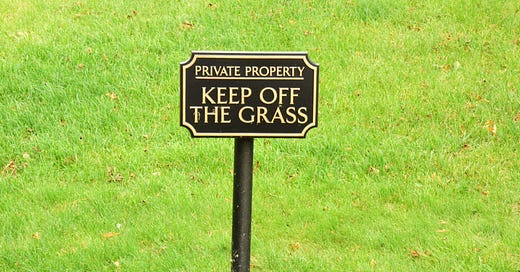Get Off My Lawn
Prediction markets and sweepstakes operators are having a bad week, and finding out that things change pretty quickly in the gambling universe.
The Bulletin Board
THE LEDE: It’s prediction markets vs. the world.
NEWS: Sweepstakes sites take some bumps.
ROUNDUP: Brazil considering an iGaming tax hike; MN tribes and racetracks at odds; Vixio’s US iGaming forecast.
THE LEDE: WSOP online bracelet event cancelled after technical difficulties.
BEYOND the HEADLINE: WSOP attendance fears appear overblown.
AROUND the WATERCOOLER: My annual Poker Hall of Fame rant.
STRAY THOUGHTS:
Sponsor’s Message: Increase Operator Margins with EDGE Boost Today!
EDGE Boost is the first dedicated bank account for bettors.
Increase Cash Access: On/Offline with $250k/day debit limits
No Integration or Costs: Compatible today with all operators via VISA debit rails
Incremental Non-Gaming Revenue: Up to 1% operator rebate on transactions
Lower Costs: Increase debit throughput to reduce costs against ACH/Wallets
Eliminate Chargebacks and Disputes
Eliminate Debit Declines
Built-in Responsible Gaming tools
To learn more, contact Matthew Cullen, Chief Strategy Officer, Matthew@edgemarkets.io
The Lede: Tribes, States, the Industry, and Anti-Gambling Groups Line Up Against Kalshi
Tuesday was apparently Amicus Brief Day, as Kalshi takes on the state of New Jersey in the Third Circuit Court of Appeals. As I posted on X, there is greater consensus that Kalshi is operating a sportsbook than that the sun is hot.
Among the amicus briefs filed in the past few days:
A coalition of anti-gambling groups, spearheaded by Stop Predatory Gambling.
The Casino Association of New Jersey.
The American Gaming Association.
60 tribes plus nine tribal organizations representing hundreds of individual tribes.
34 states (plus Washington, DC and the Northern Mariana Islands).
Others have posted the briefs and dissected the key arguments (Daniel Wallach and Dustin Gouker). I want to focus on the coalescence of a coalition of states, groups, and entities that typically disagree on most issues. This opposition is going to be hard to ignore. As Citizens’ Chris Lynch put it on X, “The political momentum driving prediction markets is about to be tested.”
Or, as my go-to for legal analysis on prediction markets, Andrew Kim wrote on X, “New Jersey has lined up an impressive array of amici: a bipartisan coalition of state attorneys general, most of Indian Country, the AGA, the NJ Casino Association.”
“The amici are doing exactly what they're supposed to: explaining the importance of this case,” Kim wrote on X. “Unlike Judges Gordon, Kiel, and Abelson, the Third Circuit has a more complete picture of the seismic regulatory upheaval Kalshi's legal position would unleash.”
Bottom line, today’s filings have shifted the mood of the conversation, and despite its bravado and friends in high places, Kalshi may be in for a rude awakening.
And this is on the heels of Monday’s reporting of class-action lawsuits and yesterday’s reporting about new fees on market makers:
News: A Bad Day for Sweepstakes
Sweepstakes were apparently engaged in a contest with prediction markets over who had a worse day, as there were three adverse outcomes for sweepstakes operators on Tuesday, with New York passing a sweepstakes prohibition bill, and two southern states, Mississippi and Louisiana, taking enforcement actions.
New York
The New York State Legislature passed a bill, S 5935, prohibiting sweepstakes in the state. New York had already issued cease-and-desist orders to sweepstakes operators, with most complying.
As Light & Wonder’s Howard Glaser noted on LinkedIn, the bill:
“Prohibits the operation, conduct, or promotion of online sweepstakes games by any applicant, licensed entity, gaming employee, or other related individuals or entities.
“Prohibits financial institutions, payment processors, geolocation providers, gaming content suppliers, platform providers, or media affiliates from supporting such games.”
The Social and Promotional Games Association (SPGA) is urging Gov. Kathy Hochul to veto the bill, claiming the "individual investors and investment firms" language threatens to kill investment, stifle innovation, and undermine New York's position as a national leader for tech and digital entertainment.”
The SPGA also highlighted Louisiana Gov. Jeff Landry’s recent veto of a sweepstakes prohibition bill, which leads me into the second sweepstakes story…
Louisiana
The Louisiana Gaming Control Board issued more than 40 cease-and-desist letters to sweepstakes and offshore online gambling sites yesterday.
The action comes days after Gov. Jeff Landry vetoed a sweepstakes prohibition bill, calling it unnecessary. According to Landry’s veto, the state already had an enforcement mechanism in place to deal with illegal gambling — which it exercised on Tuesday.
Notably, I jokingly posted that it was interesting that both sides were claiming victory in Louisiana after Landry’s veto. It appears that only one of the proclamations of victory was correct.
Mississippi
The final bit of sweepstakes news was the Mississippi Gaming Commission issuing 10 cease-and-desist letters to sweepstakes and offshore online gambling sites, including VGW.
“The online wagering offered by these sportsbook and gaming sites is illegal in Mississippi," The MGC said in a press release. “Our laws are clear that casino-style gaming and sports wagering are not allowed online in Mississippi, outside of a licensed casino… the MGC is currently providing criminal case files to our state and federal law enforcement partners and requesting prosecution.”
SPONSOR’S MESSAGE - Underdog: the most innovative company in sports gaming.
At Underdog we use our own tech stack to create the industry’s most popular games, designing products specifically for the American sports fan.
Join us as we build the future of sports gaming.
Visit: https://underdogfantasy.com/careers
Roundup: Brazil Tax Hike; MN Tribes-Racetracks at Odds; US iGaming Forecast
Brazil's Decree would increase the online gambling tax rate in October [Vixio]: Tax hikes are not exclusive to the US. Brazil's online betting tax could increase to 18% from October 1, following an emergency decree. “Article 61 of Provisional Measure 1.303/2025 amends a 2018 federal law on fixed-odds betting to allow licensed operators to retain 82% rather than 88% of their gross revenues, with the additional 6% being directed to social security and public health programs.” The decree, effective immediately, needs legislative approval within 120 days.
Tribal-commercial fight intensifies in Minnesota [Courthouse News Service]: The Minnesota Supreme Court is deciding whether non-Native card clubs can offer electronic gambling tables without violating state-tribal compacts. The dispute centers on Interblock technology used for electronic blackjack, poker, and baccarat, which tribes argue are digital slot machines. Running Aces claims these tables comply with state law (which allows cardrooms to offer card games). The case, sparked by a 2023 floor plan approval, also questions the definition of a "table" under the 80-table limit. This follows a 2024 dustup between tribes and the commercial racetracks over historical horse racing (HHR) machines.
US online gambling revenue could hit $50 billion by 2028 [Vixio]: In its latest US Sports Betting and iGaming Outlook, Vixio (a newsletter sponsor) forecasts that the US online gambling market will reach $39.5 billion in gross gaming revenue by 2028, assuming no further expansion of online casinos and limited expansion of sports betting. That number could balloon to as much as $50 billion should more states come online.
News: WSOP Experiences Technical Difficulties
Event #7, a $250 Mystery Bounty online bracelet tournament, had enough technical issues (players being booted or unable to log in) that the WSOP had to cancel the two-day event midstream.
Gary Gates was in the tournament and explained the situation in an X thread: “Hundreds of players were "Sitting Out" of the tournament, meaning -- for one reason or another -- they were not actively playing the event and their chips were being blinded out and amassed by those players who were able to play with no issues.”
The issues began when all players were in the money, and will keep the bounties they pulled. However, the WSOP hasn’t determined how it will split the prize pool, but it did provide each player with a $500 ticket to use for any WSOP online tournament in the next year.
The fiasco has led to complaints about WSOP.com’s outdated software (and online poker software more broadly).
These criticisms highlight a much larger issue confronting online poker: its relatively low standing in the online gambling hierarchy. There is little money in online poker, so states don’t prioritize it, and operators aren’t investing in it to the same extent as they do in sports betting and online casinos.
Here are my previous columns on the topic, the first explains why online poker has been relegated to a third-tier product by gambling companies and lawmakers. The second makes the case for legalization.
I recently spoke to Pokerfuse’s Nick Jones about the state of online poker in the US:
Beyond the Headline: No Signs of Attendance Dip
Pokerfuse’s Anuj Ajora has been diligently tracking every registration and every dollar contributed to the 2025 WSOP prize pool, comparing it with last year’s WSOP. The results for 2025 are a slight improvement over 2024.
SPONSOR’S MESSAGE - Kambi is the industry’s leading independent provider of premium sports betting technology and services. Trusted by dozens of operators worldwide, each benefitting from the power of Kambi’s global network, Kambi has a proven track record of giving partners the decisive competitive edge required to grow and outperform the market.
As the home of premium sports betting solutions, Kambi offers an expansive product portfolio that caters to the evolving needs of operators and players alike. At its core is Kambi's flagship Turnkey Sportsbook, renowned for its scalability, flexibility, and unrivaled track record of delivering world-class betting experiences globally. Complementing this are Kambi’s cutting-edge standalone products: Odds Feed+, Managed Trading, Sportsbook Platform, Bet Builder, Esports, and Front End.
Around the Watercooler
Social media conversations, rumors, and gossip.
Welcome to my annual attempt to fix the Poker Hall of Fame, this time with an assist from Craig Tapscott.
I’ve been banging this drum for more than a decade. Last year, I dedicated a feature column to the Poker Hall of Fame, where I identified three issues that need to be addressed.
Fake Tradition — “For something created on a whim as a gimmick in 1979 and put into mothball in the late 1990s, there seem to be a lot of unbreakable traditions surrounding the Poker HOF… It’s time for poker to break free of “tradition” because, quite frankly, it’s not old enough to have traditions.”
Exclusivity — “The Poker HOF is far too exclusive. Poker is a 200-year-old game, and the World Series of Poker is in its 55th year, yet there are only 61 people in its Hall of Fame. Football (the American version) has a similar history, developed sometime in the 1800s, with Super Bowls dating back to 1967. The Pro Football Hall of Fame is considered one of the most difficult to gain entry to, and it has 371 members. The Pro Football HOF inducts eight or more people every year. Poker inducts one, sometimes two.”
No Physical Location — The PHOF “needs a physical home, and when it gets one, I believe many of the issues I’ve mentioned will disappear because when you have an attraction and space, you need to fill it up with interesting things. A physical Hall of Fame could have exhibits and wings. It could have a superstar wing, a cash game wing, a tournament wing, a women in poker wing, a contributors wing, and so on. Imagine a world with a visitable Poker Hall of Fame with road gambling kits, playing cards and chips through the ages, memorabilia, and video highlights of great moments…”
Stray Thoughts
I was really hoping the prediction market news would die down, but it looks like we are about to get inundated with even more.











